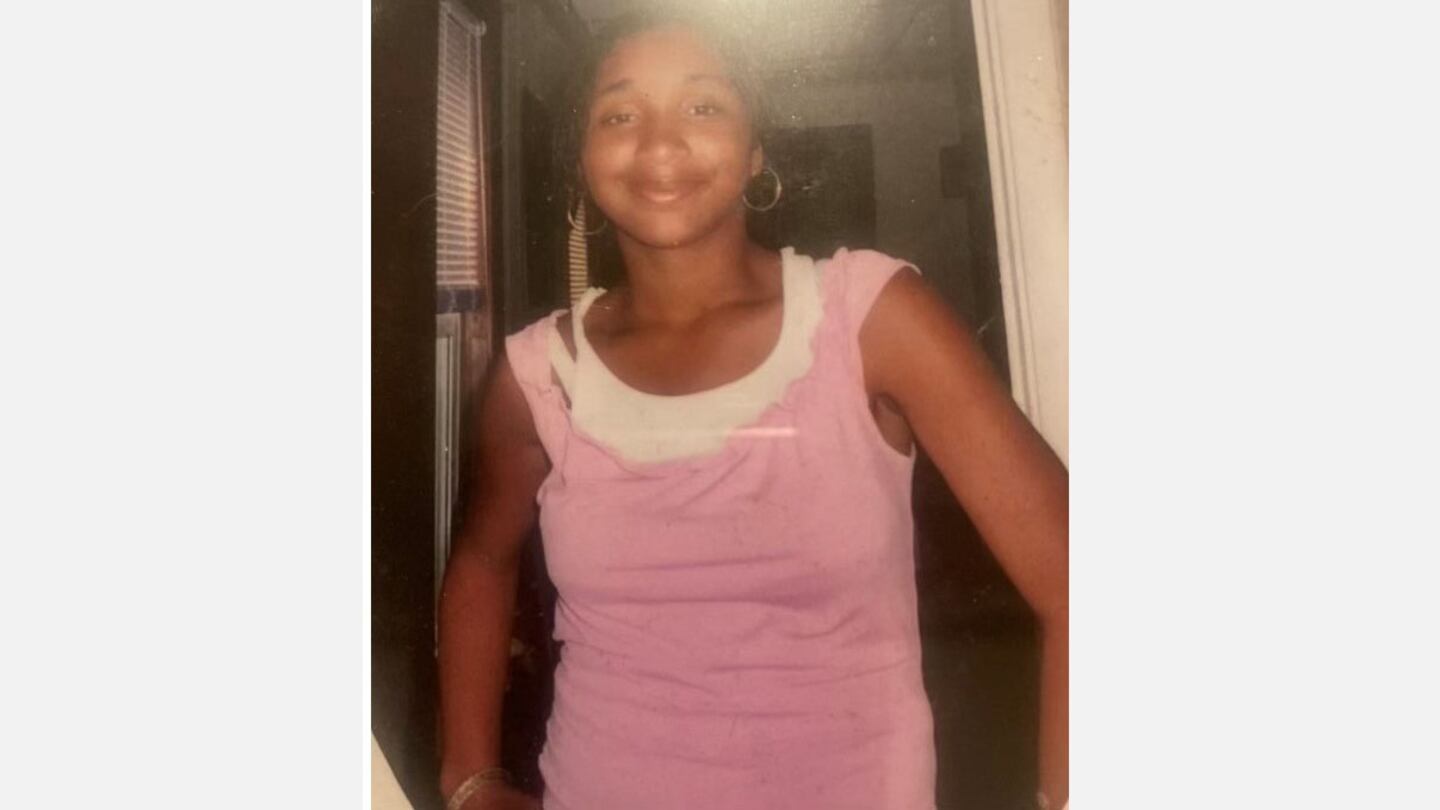Monique Payne was just 14 years old when she was placed in a youth residential treatment facility (RTF) in Massachusetts. Her mother sent her there to get mental health treatment.
Tragically, Monique died while in the facility’s care in 2006 from an untreated brain tumor that swelled.
“I sent my child to get the care she needed, and she was brought back in a casket to me. How does that happen?” Monique’s mother Theresa Payne told our Washington News Bureau.
An investigation found Monique had been complaining for days about headaches, but 911 was only called “after she stopped breathing and turned blue.”
Her family came to Capitol Hill to spread awareness about Monique’s story this week and to shine a light about dangers inside RTFs that are supposed to help kids and teens.
“They’re children being treated as animals,” said Miriah Payne, Monique’s twin sister. “They’re treated as if they’re disposable.”
“I want change,” said Ashley Sweatman, Monique’s sister. “I think less money should go in the pockets of the CEOs and more into the institution around rehabilitation… These kids need clinical intervention and they need adequate care.”
They shared their story alongside other family members, survivors and advocates as new findings were released from a two-year-long Senate investigation led by Sen. Ron Wyden (D-OR), Chairman of the Senate Finance Committee.
Wyden said the investigation included reviews of four big companies: Universal Health Services, Acadia Healthcare, Devereux Advanced Behavioral Health, and Vivant Behavioral Health Services. Wyden said staff examined more than 25,000 pages of company documents, conducted dozens of conversations with experts, and toured some facilities first-hand.
“The Committee’s investigation found that children at RTFs suffer harms such as the risk of physical, sexual, and emotional abuse at the hands of staff and peers, improperly executed and overused restraint and seclusion, inadequate treatment and supervision, and non-homelike environments,” the report said. “These harms amount to acute safety concerns and have long-term effects, including suffering, trauma and even death.”
The report points to cases of unqualified or poorly trained staff.
“Children at RTFs are often supervised by staff who are ill-equipped to address their complex behavioral health needs and, in some cases, children interact with staff who pose a direct threat to their wellbeing,” the report said. “Poor staffing leads to elopements from facilities, self-harm attempts by children, and child fatalities.”
The report said children often don’t get the mental or behavioral care they need, despite these facilities getting federal taxpayer dollars to provide those services.
“That means that American tax dollars are funding the kind of abuse our investigators found,” said Wyden during a hearing on Wednesday.
“Hardworking taxpayers should not be funding anything less than superior care,” said Sen. Mike Crapo (R-ID).
The report calls for Congress to require higher standards of care at youth RTFs and increased oversight of the companies running them.
The facility where Monique Payne was sent closed down in 2017 after multiple patient safety incidents. Her family took their case to court and while a jury did find there was some negligence, it did not find that negligence caused Monique’s death.
Her family says they’re now calling for more accountability as they honor Monique’s memory.
“She doesn’t get to get married,” said Theresa Payne. “She doesn’t get to have children. I can’t see what she was going to be.”
The companies highlighted in the report who responded to our request for comment said they disputed the characterization of the Senate investigation’s findings.
In a statement, a spokesperson for Universal Health Services (UHS) said:
“We recognize the importance of the Senate Committee’s work in this area and share their concerns regarding the treatment of children at Residential Treatment Facilities (RTFs) across the country. We regret that, despite our cooperation with the Committee throughout the course of a two-year investigation of RTFs, the report is incomplete and misleading and provides an inaccurate depiction of the care and treatment provided at UHS RTFs, as well as the safety of the residents at those facilities. The report attempts to extrapolate certain incidents and survey reports into a false narrative regarding the treatment provided, environment of care and regulatory compliance at our facilities. We vehemently dispute this characterization of our facilities.
Residential Treatment Facilities (RTFs) play a vital role in the behavioral health care continuum for youth with special, and often complex, emotional, behavioral and psychiatric needs. Universal Health Services, Inc. recognizes the importance of providing care in our facilities for these children in a safe and therapeutic environment. The dedicated staff at our facilities work tirelessly to provide the best possible care and treatment to the residents and ensure that each resident is treated with dignity and in accordance with the rules and regulations governing the operation of RTFs. UHS facilities have been providing behavioral health treatment for over 40 years.
We acknowledge that there have been incidents over our many years of dedicated service at some of our facilities where the treatment of residents has not met our expectations and have suffered harm. Such incidents belie our commitment to provide a safe and therapeutic environment as well as the policies, procedures, protocols and training for our facilities. There is no place for any such incidents in our facilities and we are committed to ensuring such events are reduced with a goal of zero. Whenever such incidents occur, remedial action is taken.
UHS has continuously cooperated with the Committee over the course of its investigation. UHS has voluntarily made nine separate productions, totaling more than 12,000 pages of documents, relating to numerous requests for information regarding the policies, practices, and clinical operations of UHS RTFs and provided multiple briefings to Committee staff to answer questions following these voluntary productions. In addition, UHS’ senior leaders have spent hundreds of hours responding to the Committee’s requests, including a culminating meeting with Committee staff that lasted more than four and a half hours. At every step of the investigation, UHS has provided thorough and transparent responses to every question posed by Committee staff.
While even one incident of harm is one too many, we have provided information demonstrating the rates of such occurrences are extremely rare across the UHS spectrum and disproves this inaccurate portrayal. The report also wholly fails to recognize the thousands of adolescents that have been successfully treated in our facilities over the years whose lives have been dramatically enhanced and quite possibly saved as a result of the care provided. The incidents and references cited in the report are not representative of the hard work of our dedicated staff whose only mission is to improve the lives of the residents they care for. UHS RTFs remain committed to being a solution to ensure that the youth of this country have options for recovery. This work is challenging and it is a high calling, one that each member of our UHS team takes very seriously. Patients come to us after a broad variety of negative experiences – they need very specialized care and treatment. Incidents of staff failing to follow our training, policies, procedures and protocols are an extreme exception and not the norm. We are proud of the positive clinical outcomes consistently achieved by our RTFs, the strong ties that we have developed and maintained with the communities we serve, and our good standing with the regulatory and administrative entities that oversee us.”
A spokesperson for Devereux Advanced Behavioral Health said in part:
“The safe, effective and compassionate care of children who need therapeutic residential services is an issue that has received too little attention for far too long from those who can impact change at the highest levels, and it has been our honor to work with the Senate Finance Committee on this critical effort. For decades, Devereux has worked with elected officials at the federal, state and county levels to create meaningful change and drive new standards of safety, transparency and accountability in care.
When it comes to the safe and effective behavioral healthcare of the most vulnerable children in our country, there is no room for competing priorities. Personal wellbeing, safety and individualized treatment success – not corporate profit – must be the only motivator. As one of the leading nonprofit providers of behavioral healthcare in the nation, Devereux invests 100% of our operating revenue, plus additional donor dollars, in care. We’ve advocated tirelessly for best practices in safety and quality of care and robust and uniform reporting requirements combined with publicly available information that empowers families and caregivers to make informed healthcare decisions and we will continue to be a leading voice pushing for transparency, accountability and excellence. Children and families deserve nothing less.
It’s unfortunate that Devereux has been lumped together in this report with three other for-profit companies that do not operate in a similar manner, but the facts on the ground tell the truth. We were saddened that during an otherwise very productive two-year partnership, the committee did not visit a single Devereux program. That said, we heartily endorse their recommendations for strengthening the overall system of residential care across the nation. In fact, Devereux provided many of the final recommendations in the report to the committee in writing or in private meetings over the last two years. These are actions and initiatives that Devereux has been many years in the progress of voluntarily implementing as part of our regular and ongoing process of continuous quality improvement. We know these recommendations will strengthen the national behavioral healthcare system, just as they have already strengthened Devereux.
As a nonprofit organization operating in the public interest, we are committed to fostering a comprehensive culture of abuse prevention, both within our organization, and across the field – one which ensures safety, quality, compassion and success. We will continue to partner with Senator Wyden and all those committed to fostering safe and nurturing environments where children can thrive.
Regarding Abuse Prevention
The report found that “children in these facilities are at risk of ‘unremediated’ sexual abuse, dangerous physical and chemical restraint techniques, and are exposed to unsanitary conditions.” This is a blanket indictment of all residential treatment nationwide, and while this can tragically be true at many facilities, and one can understand how it could especially be true at facilities which seek to maximize profit, it is categorically untrue that children at Devereux are subject to unremediated abusive or unsanitary conditions.
Devereux takes any allegation of abuse with the utmost seriousness. We have zero tolerance for abuse of any kind, and even more importantly, we have established an industry-leading comprehensive culture designed to prevent abuse from occurring in the first place. Our nonprofit status allows us to reinvest universally in that culture – with no competing priorities. Our commitment to the safety of those in our care is absolute. We are focused on both the excellence and compassion of our services. Nothing less is acceptable...
Regarding Profit Motivation
This is a very important component of the Senate’s inquiry. The report highlights crucial facts which speak for themselves, and I will point to just one for consideration. In a given year of the inquiry, one of the for-profit companies in the report invested 62% of its revenue in staffing. Devereux invested 82%. At the end of the day, all investments in program, technology, physical plant and staffing are critical – but the quality, compassion and safety of programming ultimately depends on staff. I will not comment on any other provider’s decision making, but I will comment on Devereux’s. In just the last three years, we have increased wages to our direct-care staff alone by $95Million in aggregate. We know that investments in our staff are investments in quality and safety and compassion and excellence. Appropriately staffing, training, supervising, retaining and supporting an outstanding staff corps is extremely expensive – and it is the best investment a responsible healthcare organization can make.
Further, Devereux only accepts children in our residential programs (RTFs) who specifically require the very high levels of care provided therein, and as opposed to what the committee found in other providers, our data proves this. So far in 2024, for example, Devereux has received 3,290 referrals for admission into our RTFs and we have admitted only 202 children – an acceptance rate of just 6%. This is very intentional, reflecting both our deep commitment to limiting the use of this level of care to only children who will most benefit, as well as our commitment to matching exactly the proper services and treatment professionals with individualized treatment plans for children. We could be serving hundreds of more children every day if profit was our goal. It is not.
Devereux is, and has been since 1938, a nonprofit 501(c)(3) organization. We do not operate with for-profit motivation. We do not answer to shareholders. We do not need to “find” places in our budget to make money. Devereux is a charitable organization, operating in the public interest, and our entire business model is, quite simply, different than the three other organizations involved in this inquiry…
Regarding Community-Based Care
Devereux strongly concurs with the committee’s recommendations regarding the limitations around the use of residential care and the expansion of community-based services for children. We have been working with the federal government and our partners within the states and counties for decades to build community resources. We were very proud to partner directly with Senator Wyden and others on the creation and implementation of the Family First Prevention Services Act (FFPSA) – providing several of the best-practice recommendations to the FFPSA Clearinghouse which ultimately have been rated as well-supportive of children’s success.
Our last several Devereux strategic plans specifically iterate our plans to build out a continuum of community-based care programs “downstream” from residential services. As a direct result of this commitment, we operate 760 less residential beds today than we did just five years ago.
Quite simply, our goal for more than a decade has been to put ourselves out of the residential care business because we have done such an outstanding job of preventing the need for that level of care by providing other options to children and families...
Regarding Healthcare Industry Staffing Challenges
There is no doubt that the number and adequacy of staffing within the behavioral healthcare sector is a crisis issue in every state in our nation. According to SAMSHA, by the end of 2025, U.S. demand for direct care professionals (DCPs) is expected to exceed 4.5M while the projected availability of DCPs will fall somewhere shy of 1M. More than half of all counties in the U.S. do not have one single Board Certified Behavioral Analyst to support people with Autism. The American Psychological Association predicts a shortage of 100K clinicians by 2030.
Driven by our culture of abuse prevention, dedication to safety and excellence, and because we are a nonprofit which redirects all funds, including fundraised dollars, directly back to the organization, Devereux is one of, and perhaps the only, behavioral healthcare organization doing something to seriously address this staggering issue. I make this point about our nonprofit status, as it relates to staffing, as the committee has specifically mentioned a finding that a lack of staffing in residential programs can be “endemic to the operating model” of the companies, which “treat children as payouts.” There is nothing endemic to Devereux’s nonprofit operating model that treats children as payouts. To the contrary, our nonprofit status allows us to hold quality, safety and excellence as our measures of success. Our funds are reinvested in programs, and paid forward, in many cases, specifically invested in securing, training and retaining the most qualified behavioral health workforce in the field…
Regarding Chemical Restraint
Devereux’s use of medication in all settings is extraordinarily careful, well-monitored, and in many cases, part of best-practice, multi-site collaboratives in partnership with the federal government. For example, we recently completed a three-year project with SAMSHA to develop best practices for the use of psychotropic medications in children’s psychiatric residential settings, which will be turned in likely be used to create federal guidance for providers.
As to the issue of chemical restraints, at Devereux, by definition we use them only in the rarest circumstances for the most acute patients in our intensive settings. For any medication to be given by injection, psychotropic or otherwise, there must a physician’s order. For an injection medication to be given in the case of a psychiatric emergency, a physician’s order must be made in real time – in the moment of crisis – and the injection can be given only by a physician or a nurse. A nurse must then remain present for the duration to perform ongoing medical assessment. We take this matter extremely seriously…
No system in the world is foolproof, but Devereux always strives for perfection on behalf of those we serve – and our goal is not only to create a foolproof system, but to cultivate a comprehensive culture of safety and care, one which prevents abuse before it can happen. This is what our Devereux Family Standard demands. This is what those in our care deserve.
At Devereux, we feel privileged to do this work every day, and to have done it faithfully for the last 112 years. Our nonprofit status positions us to respond nimbly to this complex and increasingly stressed operating environment, and to make constant investments in our programs and our staff. Six of our 16 Trustees of the Board are parents or siblings of those in our care. Our attention to quality and safety is absolute. We do this for people, not for profit.”
©2024 Cox Media Group












